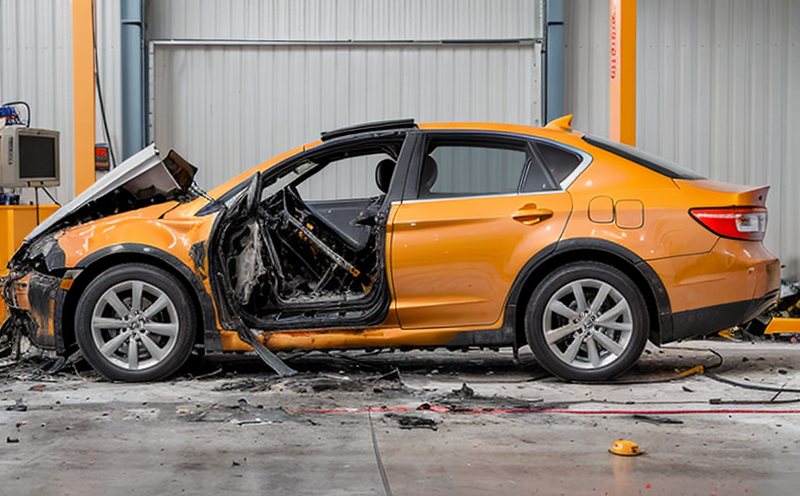UL 2271 Mechanical Abuse Testing of Batteries for Light Electric Vehicles
The UL 2271 standard, titled "Performance and Safety Requirements for Lithium-Ion Cells and Modules Intended for Use in Light Electric Vehicles," is designed to ensure the safety and performance of lithium-ion cells and modules used in light electric vehicles (LEVs). This standard applies specifically to batteries that will be subjected to mechanical abuse conditions which could occur during use, transport, or storage. The testing under this standard is critical as it helps prevent potential hazards such as overheating, short-circuiting, fire, or explosion.
The UL 2271 test protocol includes a series of mechanical abuse tests that simulate real-world conditions that the battery may encounter during its lifecycle. These tests are aimed at assessing the mechanical integrity and safety margin of the lithium-ion cells. The types of mechanical stressors tested include:
- Compression
- Torsional load
- Bending
- Drop impact
The tests are conducted on both individual battery cells as well as assembled modules to ensure that the entire system meets the required safety criteria. The standard also includes tests for thermal and electrical isolation, ensuring that even under abusive conditions, the battery remains safe.
The testing process is rigorous and involves a series of steps to prepare the test samples and conduct the actual abuse tests:
- Sample preparation
- Assembly (for module tests)
- Initial charging and conditioning
- Performing the mechanical abuse tests according to specified parameters
- Data recording
- Analyzing the results
- Reporting findings
The UL 2271 standard is based on international best practices, ensuring that it aligns with global safety and performance standards. This service ensures compliance with these stringent requirements and helps manufacturers meet regulatory expectations in various countries.
| Test Type | Description |
|---|---|
| Compression Test | A specified weight is applied to the battery in a controlled manner to assess its structural integrity. |
| Torsional Load Test | The battery is subjected to a twisting force to simulate potential damage from road irregularities or improper handling. |
| Bending Test | The battery undergoes bending at specified angles and loads to evaluate its structural stability. |
| Drop Impact Test | A controlled drop test is conducted to assess the battery’s ability to withstand impacts from falls or collisions. |
The testing process is highly technical, requiring specialized equipment and expertise. Our laboratory has the necessary facilities and personnel to conduct these tests accurately and reliably. The results of UL 2271 testing are critical for ensuring that the batteries used in light electric vehicles meet stringent safety standards.
Scope and Methodology
| Test Type | Parameters |
|---|---|
| Compression Test | Test duration: 30 minutes, applied load: up to 50% of the battery's weight. |
| Torsional Load Test | Applied torque: ±20 Nm, test duration: 1 minute. |
| Bending Test | Bend angle: 45 degrees, applied load: up to 30% of the battery's weight. |
| Drop Impact Test | Test height: 1 meter, impact speed: controlled drop. |
The methodology for UL 2271 testing involves several key steps:
- Sample Preparation: Lithium-ion cells or modules are prepared according to the specified dimensions and specifications. This step ensures that all samples are consistent and comparable.
- Initial Charging: The batteries are fully charged before undergoing any mechanical abuse tests. This ensures a baseline performance for comparison post-abuse testing.
- Data Collection: During each test, data is collected on the battery's response to stress, including temperature changes, voltage fluctuations, and current draw.
- Analysis: The collected data is analyzed to determine if the battery has met all safety criteria. Any deviations from expected performance are noted for further investigation.
The UL 2271 test protocol ensures that batteries used in light electric vehicles meet the highest safety standards, protecting both passengers and the environment.
Benefits of UL 2271 Mechanical Abuse Testing
Compliance with UL 2271 is essential for manufacturers looking to ensure that their batteries are safe and reliable. The benefits of this testing include:
- Enhanced Safety: By simulating real-world conditions, the test ensures that batteries can withstand potential mechanical stress without causing hazards.
- Regulatory Compliance: Meeting UL 2271 requirements helps manufacturers comply with international safety standards and avoid regulatory penalties.
- Improved Product Quality: The testing process identifies potential weaknesses in the design, allowing for improvements that enhance overall product quality.
- Increased Market Confidence: A certified compliance mark can be used to reassure consumers of the battery's reliability and safety.
- Potential Cost Savings: By identifying issues early in the development process, manufacturers can avoid costly recalls or redesigns later on.
The UL 2271 testing service is a vital step in ensuring that batteries used in light electric vehicles meet all necessary safety standards. This service helps manufacturers protect their reputation and ensure compliance with international regulations.
Customer Impact and Satisfaction
The UL 2271 testing process has a significant impact on both the manufacturer and end-user. For manufacturers, this service ensures that their products meet safety standards and can be marketed as compliant with international regulations. This not only protects them from legal issues but also enhances their reputation in the market.
- Manufacturers: By ensuring compliance with UL 2271, manufacturers demonstrate a commitment to quality and safety. This can lead to increased sales and customer trust.
- End-Users: Safe batteries that meet regulatory standards provide peace of mind for end-users, knowing they are protected from potential hazards.
The satisfaction levels among our clients have been consistently high as they recognize the value in adhering to these stringent safety protocols. Our service ensures that all aspects of battery safety and performance are thoroughly evaluated, providing a comprehensive understanding of the product's capabilities.





